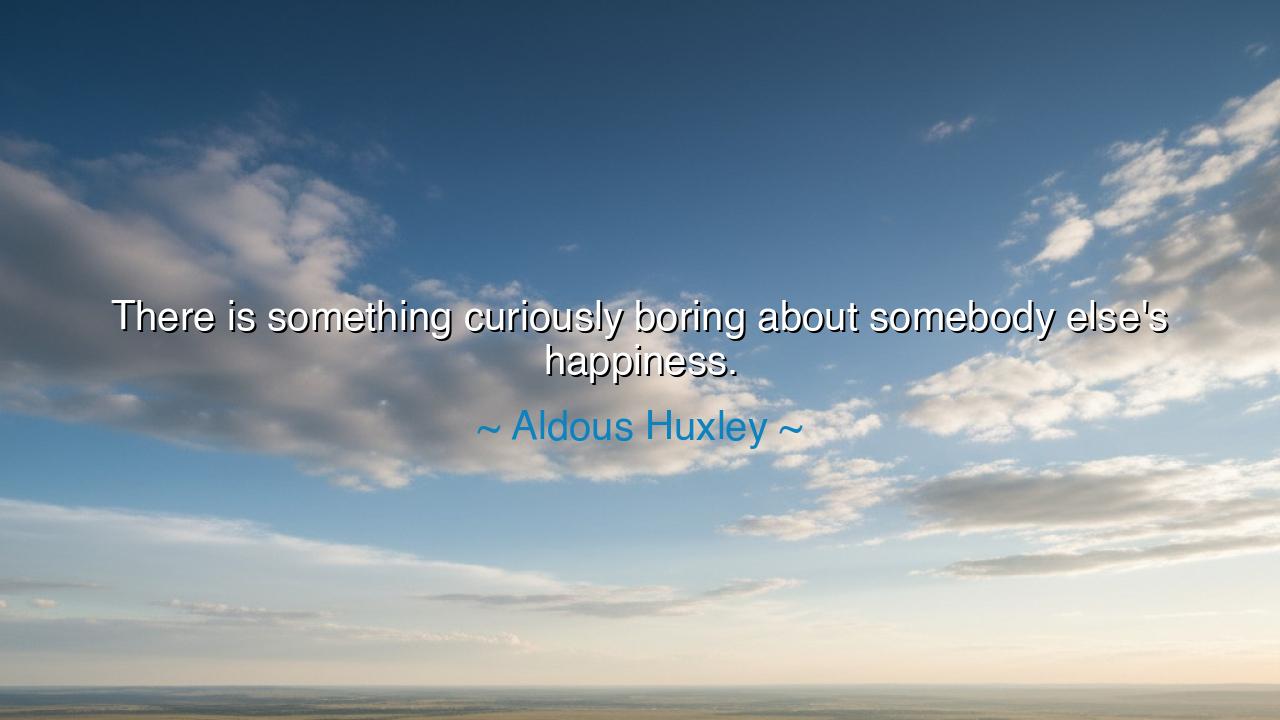
There is something curiously boring about somebody else's






“There is something curiously boring about somebody else’s happiness.” — Thus wrote Aldous Huxley, the sharp-eyed observer of the human condition, whose words slice through the veils of pretense to expose the paradoxes of the soul. His statement may seem cynical at first, even cold, yet beneath its irony lies a profound and unsettling truth: that the human heart, restless and self-centered, finds little fascination in the peace of others. We are drawn, not to calmness, but to struggle — not to serenity, but to stories of conflict, passion, and loss. Huxley reminds us that our nature hungers for drama, for movement, for the intensity of emotion, even when that emotion springs from pain.
The origin of Huxley’s words lies in his reflections on society and the psychology of man. A philosopher of modern times, he saw that happiness, though universally sought, rarely interests us when it belongs to someone else. The joy of another often feels static — lacking tension, devoid of the conflict that gives life its texture. Misery, on the other hand, draws us in; it tells a story, awakens empathy, or stirs curiosity. Huxley’s remark does not condemn happiness, but reveals how detachment and vanity warp our perception of it. We crave meaning in struggle, and yet we dream of peace — a contradiction at the heart of our humanity.
It is in our very nature to find drama compelling, for the soul is forged in contrast. A life that is endlessly tranquil may inspire envy from afar, but seldom fascination. Imagine the tranquil lake — still, perfect, and unchanging. It is beautiful, but one can gaze upon it only for so long before seeking the sound of rushing water, the crash of waves, the movement of wind. So it is with happiness: when seen in another, it seems to lack depth or challenge, while sorrow or strife holds our attention like a flame in the dark. Thus, Huxley’s insight is less a criticism of joy and more an acknowledgment of how the human mind is drawn to motion, to imperfection — to the struggle that makes existence vivid.
Consider the contrast between two lives: that of Siddhartha Gautama, the Buddha, and the troubled prince Hamlet of Shakespeare’s imagination. The Buddha, serene and enlightened, lived in harmony with the world; yet few dwell long on his peace — we study his teachings, not his tranquility. Hamlet, however, torn between doubt and duty, haunts the human imagination endlessly. His suffering resonates, his confusion mirrors our own, his agony feels alive. Huxley’s observation explains this: happiness, when witnessed from the outside, seems still and complete — it offers no mirror for our inner unrest. But struggle, pain, and imperfection reflect us, and in that reflection, we find both fascination and recognition.
Yet, Huxley’s words also carry a moral challenge. For if the happiness of others seems boring to us, it reveals not a flaw in their joy, but a blindness in our hearts. We are too quick to value what is dramatic over what is genuine, too easily captivated by suffering and scandal. The wise, however, learn to find beauty in the quiet, to rejoice in the peace of others as in their own. It takes maturity and humility to celebrate happiness that does not belong to us, to see in another’s serenity not dullness, but a sign of victory over chaos. To do so is to cultivate empathy — the ability to find wonder in the calm, not only the storm.
In our age, filled with noise and spectacle, Huxley’s insight becomes prophetic. The world now feeds on the drama of unhappiness — conflict in the news, outrage in conversation, tragedy in art. We scroll endlessly through the sorrows of others, finding in them a strange form of entertainment. Meanwhile, quiet contentment passes unnoticed, as though joy without struggle were of no consequence. But this is a distortion of spirit. For happiness, though quiet, is not empty; it is the culmination of struggle, the fruit of endurance, the hard-won peace after battle. The one who can perceive the depth in happiness — their own or another’s — has achieved true wisdom.
So, my listener of the future, take this teaching to heart: train your soul to see the beauty in peace. Do not crave only the fire of drama; learn to honor the stillness of joy. When you meet someone whose life is serene, do not dismiss it as dull — instead, ask what storms they have endured to reach such calm. Celebrate their happiness as a triumph of spirit, and let it remind you that your own peace is possible. Turn your fascination inward: seek not the spectacle of suffering, but the discipline of joy.
For in truth, as Huxley’s irony conceals, happiness is never boring to the one who truly understands it. It is the music between heartbeats, the quiet after the storm, the steady flame that endures when all else has burned away. To the wise, the peace of another is not tedious, but sacred — a glimpse of what all souls are striving toward: a joy so complete, it needs no applause.






AAdministratorAdministrator
Welcome, honored guests. Please leave a comment, we will respond soon